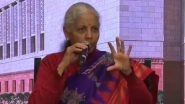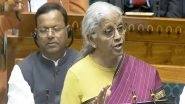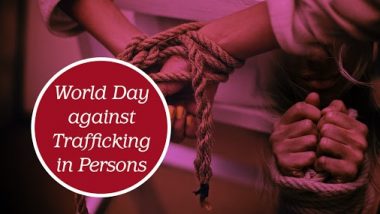Every year, the World Day Against Trafficking in Persons is observed on July 30 across the world. Today, human trafficking is the second largest and fastest growing criminal enterprise in the world. The 2020 theme for the World Day Against Trafficking in Persons will focus on the first responders to human trafficking. This means, the focus this year will be on the first responders to human trafficking. These are the people who work in different sectors - identifying, supporting, counselling and seeking justice for victims of trafficking, and challenging the impunity of the traffickers.
Trafficking in persons is a serious crime and a grave violation of human rights. Every year, thousands of men, women and children fall into the hands of traffickers, in their own countries and abroad. The 2020 theme for the World Day Against Trafficking in Persons is “Committed To The Cause - Working On The Frontline To End Human Trafficking". According to details on the UN website, during the COVID-19 crisis, the essential role of first responders has become even more important, particularly as the restrictions imposed by the pandemic have made their work even more difficult. Still, their contribution is often overlooked and unrecognized.
World Day against Trafficking in Persons History
Every country in the world is affected by human trafficking. In 2006, responding to the Economic and Social Council (ECOSOC) request for intergovernmental agencies to further cooperate in order to strengthen technical assistance provided to countries in the area of human trafficking, the Government of Japan hosted a coordination meeting of international organizations working to counter trafficking in persons.
The participating organizations ILO, IOM, UNICEF, UN Women, NHCR and UNODC decided to continue the effort initiated and proposed the creation of a coordination group. The Inter-Agency Coordination Group Against Human Trafficking (ICAT) was formally established in March 2007. In 2010, the General Assembly adopted the Global Plan of Action to Combat Trafficking in Persons, urging Governments worldwide to take coordinated and consistent measures to defeat this scourge. In September 2015, the world adopted the 2030 Sustainable Development Agenda and embraced goals and targets on trafficking in persons.
World Day against Trafficking in Persons Significance
Globally countries are detecting and reporting more victims and are convicting more traffickers. This can be the result of increased capacity to identify victims and/or an increased number of trafficked victims. The key messages focus on the positive, recognizing the importance of the work done by first responders, as well as seeking support and raising awareness that these actions need to be sustained and replicated. The stories will also highlight how first responders remained committed during the pandemic.
Every country in the world is affected by human trafficking, whether as a country of origin, transit, or destination for victims. Traffickers the world over continue to target women and girls. The vast majority of detected victims of trafficking for sexual exploitation and 35 per cent of those trafficked for forced labour are female. According to the 2018 UNODC Global Report on Trafficking in Persons, trafficking happens all around us as the share of persons trafficked within their own country has doubled in recent years to 58 percent of all detected victims.
(The above story first appeared on LatestLY on Jul 29, 2020 08:30 PM IST. For more news and updates on politics, world, sports, entertainment and lifestyle, log on to our website latestly.com).













 Quickly
Quickly


